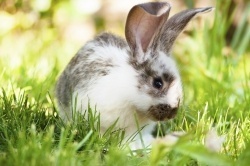
Kidney stones in rabbits
Kidney stones in rabbits Kidney stones are a frequently occurring problem in rabbits. Depending on their location, these may be referred to as kidney stones, ureteric stones, bladder stones or urethral stones. Urinary gravel is a sand-like deposit of urine crystals in the bladder.The formation of urinary stones is caused not only by chronic urinary tract infections, but also from a faulty diet such as an oversupply of calcium and vitamin D. Age and gender, however, also seem to be factors. Older male rabbits, for example, are more frequently affected by urinary stones. In addition, an inadequate water supply seems to promote the formation of urinary stones.
The symptoms are very different and unfortunately often unspecific. It is often found that the animals no longer eat well and that their general condition suffers. More specific symptoms are increased urge to urinate, painful urination and cloudy or bloody urine. If the urinary tract is blocked by urinary stones, the rabbit can no longer release urine. The inability to urinate is a typical symptom of kidney stones.
If a stone is blocking the urinary tract, this is a life-threatening emergency as the urine cannot be released and therefore accumulates. Therefore you should visit your veterinarian as soon as possible if you suspect urinary stones, so that any stones blocking the urinary tract can be removed immediately.
Unlike many other mammals, calcium metabolism in rabbits is extremely dependent on their feed. The more calcium in the food, the more it is absorbed in the intestine. Excess calcium is excreted mainly via the kidneys, so that feeds with a high calcium content cause the calcium concentration in the urine to rise sharply. Kidney stones in rabbits therefore consist mainly of calcium compounds.
The formation of kidney stones can be prevented by supplying species-appropriate feed. Animal feeds with high calcium contents should be avoided. Lucerne, parsley, dandelion, kohlrabi leaves and broccoli are especially rich in calcium. Lucerne is often found in commercial feeds for rabbits. You should avoid giving your darlings such products.
Wiesenheu consists of meadow grasses and herbs that have been dried by the sun and warm air, and is especially suitable as a low-calcium base feed for rabbits. Sensitiv is a very gentle, low-calcium and low-protein forage that can be fed to animals in unlimited quantities. Blütenmix offers variety through its special mixture of flowers, grasses and herbs. Blütenmix may be given as a complete feed or as a supplement to hay.
Grünhafer is a very good additional feed that’s rich in crude fibre and low in calcium. You can also enhance your rabbit's food with Gartenschmaus. Gartenschmaus consists of delicious and healthy ingredients such as root vegetables, blossoms and raspberry and blackberry leaves.
Rabbits with kidney stones also benefit from Bergsiegel Brennnesselblätter. Nettle leaves are said to have diuretic and urine-acidifying effects.
It is especially important that a sufficient supply of fresh drinking water is provided. Rabbits require a daily water intake of about 50–150 ml per kg of body weight, depending on size.
Dr. med. vet. Katharina Boes
June 2015 ©AGROBS GmbH
Sources*:
June 2015 ©AGROBS GmbH
- Garbisch K., Zwart P.: Krankheiten der Heimtiere. Schlütersche Verlagsgesellschaft mbH, 2015
- Zinke, J.: Ganzheitliche Behandlung von Kaninchen und Meerschweinchen. Sonntag Verlag, 2004 Rappold S.: Vergleichende Untersuchungen zur Urolithiasis bei Kaninchen und Meerschweinchen. Dissertation, Tierärztliche Hochschule Hannover, 2001
(* The references refer to the technical content of the text and not to the product recommendations.)



